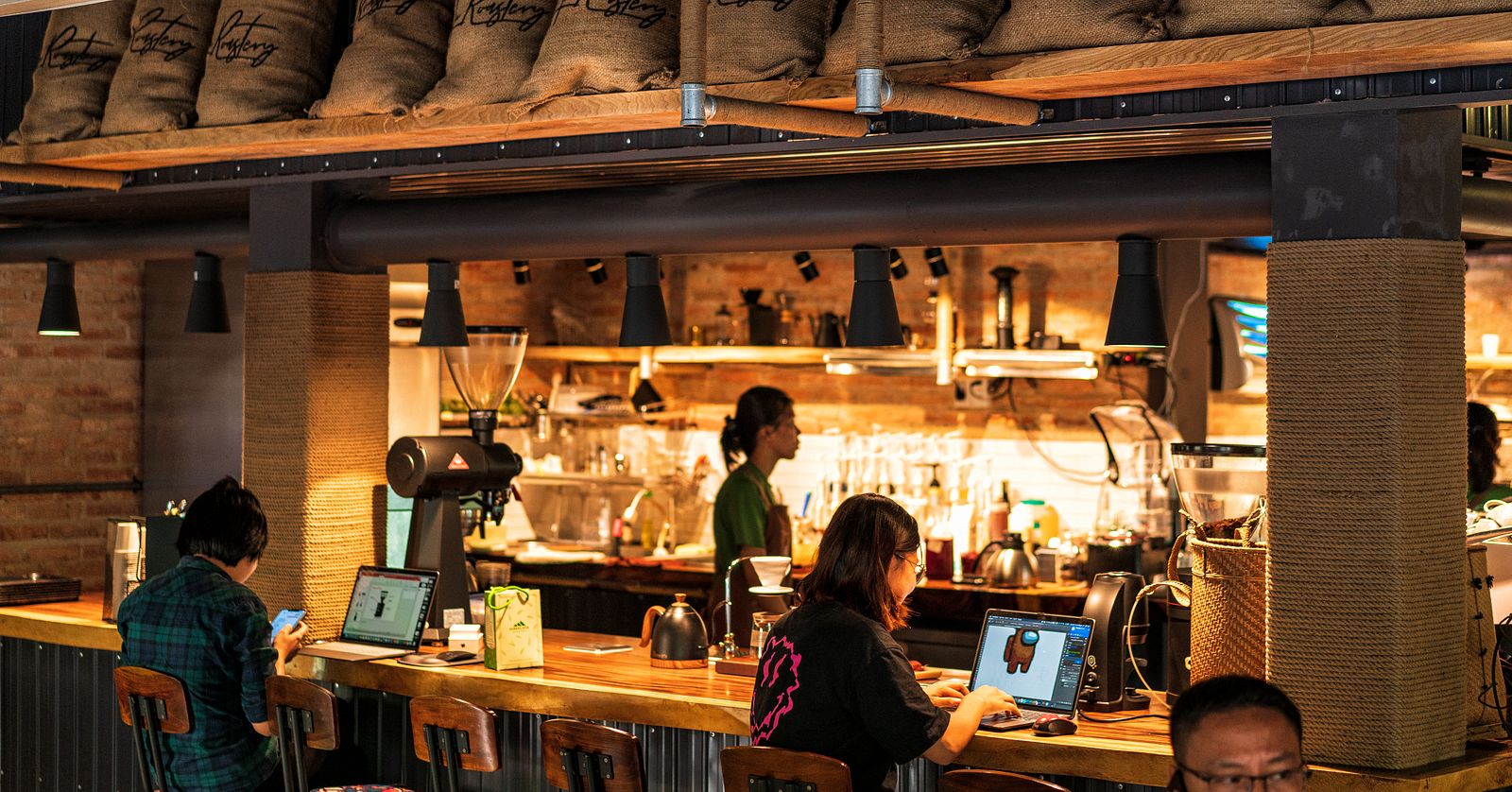Quán của Thời Thanh Xuân not only encompasses the youth of its founder, Võ Thành Luân, it’s also where hard-of-hearing Vietnamese can write their own story, learn, focus on self-development, and be a part of society.
A cafe without the usual bells and whistles
It doesn’t matter whether you’re at Thời Thanh Xuân’s Da Lat or Saigon location, a feeling of calm will wash over your visit. For first-timers, you’re likely to miss Thời Thanh Xuân’s Saigon cafe, as it’s based inside a nondescript tube house on Phu Nhuan District’s Truong Quoc Dung Street. There’s no ostentatious marquees, flashy neon signs, or any security guard intently perusing a newspaper in front. Park your bike in the front yard, open the cafe’s homely metal door, and a whole different world of quietude and serenity beckons you.


On the day of our visit, my photographer colleague and I are the first customers to Quán. Spotting us from afar, the only employee of the shop promptly opens the door for us and shows us to our table. Before spotting her bright smile, we are greeted by a soothing scent of pinewood and a mellifluous instrumental track. Not needing to be told, every patron, including us, is conscious of our speaking volume, at times, even reducing it to mere murmurs.
Like every staff member of Quán in Da Lat and Saigon, the waitress working during our visit is deaf. Even though I was briefed by a friend about the cafe’s concept, I couldn’t help feeling a bit lost during my first time here. How do I order? How do we ask for their permission to take photographs? The qualms don’t stay in my mind for long, as right after we settle in, the waitress brings over a menu along with detailed instructions: “Please pick your drink from the menu. Choose the corresponding colored stick so our hard-of-hearing staff can understand you. Thank you for supporting Quán!”


Within just five minutes, we experience one surprise after another. Flipping through the menu, we can’t figure out the prices of items. Thanks to another notice placed next to a donation box at the cashier, I realize that Thời Thanh Xuân doesn’t have a set price for its beverages, but patrons can pay to their heart’s content. The only merchandise with price tags is handmade soaps, essential oils and memorabilia that were created by the staff. According to Luân, the business has a five-hectare plantation in Da Lat to grow crops and herbs, and produce handmade crafts. At the moment, Quán is selling nine types of oils, including lavender, geranium, lemongrass, citronella, pine, cinnamon, rosemary, mint, and orange.


This carefully thought-out space is not only a haven for hearing folks seeking a bit of solitude amidst an ever-buzzing town, it’s an important connector for the local community of hard-of-hearing people, those who use sign language. A cute corner here allows visitors to leave a note on the wall. A plethora of heart-warming messages dot the small space — some express fondness for the friendly staff, some jot down their reservations of interacting with deaf people for the first time, and some gush about the feeling of peace while sipping on a cup of joe here. The cafe has more than once been burglarized, and according to the owner, losing money does not hurt as much as losing the heartfelt notes.



For the founders of Quán Của Thời Thanh Xuân, the business is not a charity. They want to pursue a social enterprise model to help the deaf develop personal goals; they can learn while working to create valuable and useful products. “People assume that the hard-of-hearing are ingenuous, simple and somewhat low-tech, but that’s incorrect. They have the same intellect and needs just like everybody else, sometimes even more, they just can’t hear or speak,” Vũ, who’s in charge of the cafe’s marketing, shares.
“Take the example of Khôi, who bakes desserts for Quán. The pastries he creates are very popular thanks to their special flavor that’s not too rich or decadent. He’s also a very impressive painter, has a decent income, and is well-loved by patrons,” he adds. “After working for a while, Khôi saved enough money to build a kickass personal computer. In another case, Hà is well-versed in fixing utility systems and has switched to trading electronic parts.”
Through our paper-based communication with the cafe’s other staff, I find out that they’re all very talented. I get to know Thùy, one of the place’s most sterling drink mixers. Under the tutelage of the senior staff, she only needed six months to master the menu. Mixing wasn’t the only skill she dabbled in: she also studied sign language and the Vietnamese language. Each endeavor unfolded swimmingly thanks to her quick wit and steely resolve. Thùy aspires to be a professional mixologist. Seeing the level of focus she gives to the creation of each drink, I believe she will soon make that dream a reality. Sipping on the warming, bold cup of hot chocolate that she made, I have total trust that it will come true.
When asked about “dream” or “passion,” they don’t quite have a concrete idea, but in general, the staff members are all well-aware of their current career, constantly working on creating values for themselves and their community. There’s no need to proclaim that “I am capable of this or I will become that” — they’re unostentatiously going about their personal journey.

Thùy is very passionate about creating beverages.

Carving one’s own path is not challenging because of the path itself
Quán Của Thời Thanh Xuân is not the first business employing deaf staff. Before, many enterprises have formed and achieved certain levels of success, such as the notable “no word” bánh khoái eatery in Hue, Da Nang’s Bread of Life Bakery, Saigon’s Lặng Cafe, Hanoi’s Tâm Cafe, etc. A common quality to all of these establishments is that they don’t commercialize sympathy, but they attract customers by the merits of goods and services created by deaf people. Each makes their mark due to different qualities, but they all offer a link to connect the hard-of-hearing to one another and to society.

Still, a significant number of companies across every field remain neglectful and reluctant to hire people with disabilities, especially those who are deaf. The most obvious reason is the lack of communication. Most of Vietnam’s hard-of-hearing citizens mainly use sign language and are not used to verbal communication. The latter is not well-established among the hearing, and even translators are few and far between.
According to statistics from the Ministry of Labour - Invalids and Social Affairs, in 2015 seven million Vietnamese had a disability, 15% of whom are deaf. Access to proper education for the hard-of-hearing is still lacking, with just 70 specialized schools and institutions across the country, mostly in major metropolises. Data by the Center for Research and Education of the Deaf and Hard of Hearing (CED) suggests that it takes deaf students from seven to 10 years to finish primary school, and only some graduates move on to secondary and high school. At the finishing line, their average age is 25. They are thrust into life with significant challenges: in communication, in work experience, and in finding sign language interpretation.
Hence, the existence of social enterprises aiming to provide practical skills and knowledge has been of great help in the integration of people with disabilities into society. Compared to previous decades, when most deaf Vietnamese undertook labor-intensive jobs, there are more and more hard-of-hearing youths joining sectors like services, arts, IT, etc. Social campaigns offering assistance are also growing to boost the livelihood of people with disabilities.
“The journey is arduous not because of the rivers and mountains, but because of the mind fearing the rivers and mountains” — a quote by writer Nguyễn Bá Học echoes in my head as I watch the staff at Quán Của Thời Thanh Xuân go through their daily tasks. Suddenly, I am overcome with a new energy to step forward on my own journey.

Quán Của Thời Thanh Xuân is open from 8:30am to 9:30pm. The Da Lat location is at 9 Trieu Viet Vuong.
To sum up:
Taste: 4/5 — Both the tea and coffee smell incredible, but the menu is not too diverse.
Price: 6/5
Atmosphere: 5/5
Friendliness: 5/5
Location: 4/5
Quán của Thời Thanh Xuân
1e Truong Quoc Dung, Ward 8, Phu Nhuan, HCMC

















